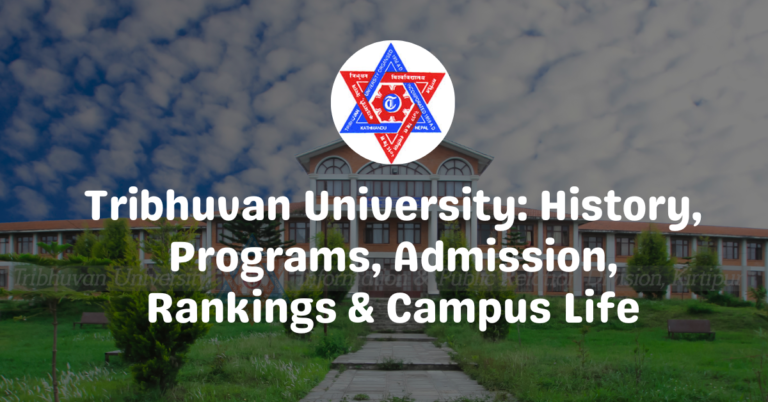BSc Microbiology in Nepal: Complete Guide
Introduction to BSc Microbiology


BSc Microbiology is rapidly becoming one of the most sought-after undergraduate science programs in Nepal. With increasing health awareness, biotechnology advancements, and demand for skilled microbiologists in hospitals, pharmaceuticals, food industries, and research institutions, this degree is both relevant and future-proof.
In Nepal, BSc Microbiology is offered under the affiliations of three major universities: Tribhuvan University (TU), Pokhara University (PoU), and Purbanchal University (PU). The course typically spans four years and blends theoretical knowledge with practical skills in labs, covering microbiological techniques, immunology, virology, molecular biology, environmental microbiology, and industrial microbiology.
What makes this degree especially appealing is its interdisciplinary nature. It touches everything from medical sciences to agriculture and environmental science, giving students multiple career pathways. With Nepal’s growing biotechnology and public health sectors, graduates are finding more opportunities locally and internationally than ever before.
In this detailed guide, you’ll learn everything you need to know about studying BSc Microbiology in Nepal in 2025 – including colleges, syllabus, fees, scope, and career options.
Why Study Microbiology?
The Growing Relevance of Microbiology
Let’s be honest—our world is facing a microbial crisis and revolution at the same time. From pandemics to probiotics, microbiology is everywhere. Microbiology is becoming increasingly significant due to public health challenges, antimicrobial resistance, and the need for skilled professionals in diagnostics, research, and biotechnology.
Microorganisms are tiny but mighty. They impact health, environment, agriculture, and industry. Studying them is like holding a microscope to the invisible forces that run our planet. And that’s why microbiologists are becoming indispensable.
In the wake of the COVID-19 pandemic, the importance of microbiology has skyrocketed. Nepal’s government, healthcare system, and industries are now investing more in labs, diagnostics, and research. This shift is creating massive demand for microbiologists trained in local contexts.
Global and Local Demand for Microbiologists
The World Health Organization and other international bodies continue to urge nations to strengthen their lab and diagnostic infrastructure, especially in developing countries like Nepal. Locally, microbiologists are needed in:
- Hospitals for clinical diagnostics
- Government and private labs
- Pharmaceutical manufacturing
- Food safety and quality control
- Research organizations and universities
- NGOs involved in water sanitation and public health
Moreover, with Nepal slowly emerging as a hub for medical tourism and biotech ventures, the global job market is open for skilled microbiology graduates who want to explore international opportunities after gaining foundational experience at home.
Eligibility Criteria for BSc Microbiology
Academic Requirements
If you’re dreaming of diving into the microscopic world, here’s what you need:
- You must have passed +2 Science or equivalent (such as A-levels or I.Sc) with Biology as a major subject.
- A minimum GPA of 2.0 or second division is required in most colleges.
- English, Chemistry, and Biology should be core subjects in your higher secondary education.
- Some colleges might have specific cut-off percentages based on their intake capacity and previous admission competition.
It’s crucial to check each college’s specific admission requirements. For instance, Kathmandu College of Science and Technology (KCST) and St. Xavier’s College are highly competitive and expect excellent academic performance.
Entrance Exams & Admission Process
Most colleges affiliated with Tribhuvan University and other universities conduct entrance exams for BSc Microbiology. The entrance test usually includes:
- Multiple-choice questions (MCQs) from Biology, Chemistry, and English
- Total marks typically range from 100 to 150
- Some universities include logical reasoning or general knowledge sections
After clearing the entrance, students are selected based on a merit list, which may consider a combination of entrance scores and +2 results.
Admission cycles generally begin between August and October. It’s wise to start preparing for the entrance exam right after your +2 exams are over. Books like “Dinesh Objective Biology” and “Modern’s ABC” can be helpful.
Top Colleges for BSc Microbiology
Nepal has several reputed institutions offering BSc Microbiology, primarily affiliated with Tribhuvan University, Pokhara University, and Purbanchal University.
Tribhuvan University Affiliated Colleges
TU is the oldest and most popular university in Nepal. It offers BSc Microbiology through multiple affiliated colleges. Some of the best among them include:
- St. Xavier’s College, Maitighar
Renowned for quality education, research exposure, and outstanding faculty. Entry is extremely competitive. - Amrit Science Campus (ASCOL), Lainchaur
Government college with affordable fees and excellent lab infrastructure. - Kathmandu College of Science and Technology (KCST)
Offers strong academic guidance and research-based teaching. - Oriental College of Science and Technology
Offers a blend of affordability and academic excellence.
Purbanchal University Affiliated Colleges
- Purbanchal University School of Science and Technology
Located in Biratnagar, offers good lab facilities and is gaining popularity in Eastern Nepal. - Nobel College, Kathmandu
A well-known name offering BSc Microbiology under PU with good internship opportunities.
Pokhara University Affiliated Colleges
- Crimson College of Technology, Butwal
Offers state-of-the-art lab facilities and collaborative programs. - Pokhara University School of Health and Allied Sciences
Located in Lekhnath, provides a comprehensive curriculum with strong research orientation.
Each college varies in terms of fees, faculty, lab exposure, and research opportunities, so visiting campuses or attending info sessions can help in making a smart decision.
Practical and Laboratory Components
Microbiology is a lab-heavy subject, and students spend a lot of time in:
- Microscopy & staining techniques
- Culture preparation and microbial isolation
- Antibiotic sensitivity testing
- Water quality analysis
- Molecular DNA techniques
Practical exams and lab reports are a major part of the internal evaluation. You’ll also get exposure to real-life samples, case studies, and project-based learning during your final year.
Fees Structure of BSc Microbiology
When it comes to affordability, Nepal offers one of the most budget-friendly options for studying microbiology compared to many other countries. The total fee for a BSc Microbiology degree in Nepal varies significantly depending on the type of institution (government vs. private), university affiliation, facilities, faculty, and location.
Here’s a general idea of the fee structure:
| Type of College | Estimated Total Fees (4 Years) |
|---|---|
| Government Colleges (e.g., ASCOL) | NPR 150,000 – NPR 250,000 |
| Semi-Private Colleges | NPR 300,000 – NPR 500,000 |
| Private Colleges (e.g., Nobel, St. Xavier’s) | NPR 500,000 – NPR 900,000 |
These fees typically cover tuition, lab charges, library access, internal assessments, and some project work. However, other costs such as hostel accommodation, transportation, reference books, entrance exam preparation, and additional workshops are not usually included.
Some top-tier private colleges might seem expensive, but they offer better lab exposure, internship networks, and student support services. Scholarships are also available based on:
- Academic excellence
- Entrance exam performance
- Financial need
- Female and underprivileged student quotas
It’s always advisable to contact individual colleges and ask for the most updated fee structure and available scholarship schemes before making a final decision.
Scope of Microbiology
Job Opportunities
Microbiology has become a backbone for healthcare, food safety, pharmaceuticals, and environmental monitoring. In Nepal, BSc Microbiology graduates are finding increasing opportunities, especially as diagnostic centers and industries grow beyond Kathmandu Valley.
Here’s where a microbiology graduate can work:
- Hospitals and Diagnostic Labs: Running cultures, identifying infections, handling antibiotic resistance reports.
- Pharmaceutical Companies: Quality assurance, fermentation, production of antibiotics and vaccines.
- Food & Dairy Industries: Checking food safety standards, preventing contamination, shelf-life testing.
- Water and Environmental Testing Labs: Microbial analysis of drinking water, wastewater, and soil.
- Research Institutions & Universities: Engaging in local and global microbial research.
- Public Health Organizations: Involvement in disease surveillance, outbreak investigations, and community health awareness.
- NGOs and INGOs: Working in sanitation, hygiene, and healthcare projects in remote and urban regions.
With Nepal’s population increasing and urbanization accelerating, these sectors are expanding their capacity, which means microbiology graduates are now more valuable than ever before.
Higher Studies Options
If you don’t want to stop at a BSc, you’re in luck. BSc Microbiology graduates in Nepal can pursue:
- MSc in Microbiology or Medical Microbiology
- MSc in Biotechnology or Molecular Biology
- MPH (Master in Public Health)
- MSc in Environmental Science
- Postgraduate Research or PhD Abroad
Many students even move on to study in countries like India, Australia, UK, Japan, or the USA where microbiology is a hot field backed by cutting-edge research and industry funding.
Moreover, qualifying for competitive exams like GRE, TOEFL, or IELTS opens doors for scholarships and assistantships abroad, giving students international exposure and high-paying career options.
Career Opportunities After BSc Microbiology
Government Sector Jobs
Graduates who are keen to serve the nation while also pursuing science often choose government careers. Here’s a look at some government job sectors that hire microbiology graduates:
- Health Ministry Laboratories
- Nepal Food and Drug Administration
- Department of Water Supply and Sewerage
- Public Health Offices across districts
- Research Divisions under NAST (Nepal Academy of Science and Technology)
- Agricultural and Animal Health Labs
Some of these jobs are permanent, pensionable, and highly respected, especially if you pass Lok Sewa Aayog (Public Service Commission) exams. These positions typically involve research, lab work, and policymaking support in public health.
Private Sector & NGOs
In the private domain, the possibilities are diverse and well-paying:
- Hospitals and Clinics: Clinical lab technologists are in high demand.
- Biotech Startups: Work on fermentation, microbial products, and diagnostics.
- NGOs like WHO, UNICEF, and Save the Children: Microbiologists contribute to sanitation, vaccination programs, and health research.
- Academia: If teaching interests you, many private colleges hire BSc holders as assistants or lab technicians, while you pursue MSc.
On average, a fresh graduate earns around NPR 15,000 – NPR 25,000/month. However, those with field experience or specialized skills (like PCR, ELISA, Biotech instrumentation) can command salaries upwards of NPR 40,000 – NPR 70,000/month or even more in the private sector and INGOs.
Challenges in the Microbiology Field
Infrastructure & Lab Resources
Let’s face it—Nepal is still catching up when it comes to scientific infrastructure. While some colleges offer advanced laboratories, others still struggle with basic resources. Issues often include:
- Limited access to high-end lab equipment (e.g., PCR machines, spectrophotometers)
- Inconsistent electricity and internet for research purposes
- Lack of updated textbooks and journals
Students in rural colleges often have to travel to Kathmandu or Pokhara for exposure and internships, adding logistical challenges to their academic life.
Research Funding & Facilities
Though microbiology is a research-driven field, funding for research in Nepal is minimal compared to global standards. Students find it hard to publish papers, attend conferences, or even carry out their final-year thesis due to budget constraints.
The government is slowly addressing this gap through organizations like NAST and MoEST, but the pace is sluggish. To combat this, students are encouraged to apply for international research internships, collaborate with NGOs, or join faculty-led projects in university labs.
But don’t let these hurdles demotivate you—they are the same obstacles that future microbiologists like you will help solve.
Tips for Success in BSc Microbiology
To thrive in microbiology in Nepal or anywhere in the world, here are some golden tips:
- Master the Basics Early: Strong foundations in biology and chemistry help tackle advanced topics with ease.
- Stay Curious and Ask Questions: Microbiology is a dynamic field—new organisms, resistance patterns, and lab techniques emerge every year.
- Get Comfortable with Lab Work: Techniques like Gram staining, culture methods, and PCR are your bread and butter.
- Use Digital Resources: YouTube tutorials, PubMed journals, and online courses (e.g., Coursera, edX) are invaluable.
- Start a Portfolio: Document your lab skills, research work, presentations, and projects. It will be useful for internships and jobs.
- Network With Peers and Professors: Collaboration often leads to research and publication opportunities.
- Never Ignore Soft Skills: Communication, writing, and data presentation skills matter—especially when writing reports or attending interviews.
Keep your passion alive. Microbiology isn’t just a career—it’s a mission to understand and protect life on a microscopic level.
Student Life in Microbiology Colleges
Campus Activities & Lab Exposure
Studying BSc Microbiology isn’t just about textbooks and Petri dishes—it’s a full-on college experience. Student life in microbiology colleges varies from one institution to another, but some common threads run across the board.
Lab-Centered Learning:
From day one, you’ll be spending a lot of time in the lab. Whether it’s culturing bacteria, examining slides under a microscope, or conducting biochemical tests, lab work becomes second nature. Most colleges schedule regular practical sessions alongside lectures. You’ll also be assessed based on lab attendance, accuracy, and record-keeping.
Student Clubs and Societies:
Most top colleges—especially St. Xavier’s, ASCOL, and Kathmandu University—have science or microbiology clubs. These organize:
- Guest lectures and seminars
- Microbiology exhibitions
- Field visits to pharmaceutical companies, dairy industries, and diagnostic labs
- Poster presentations and quiz competitions
Research-Oriented Environment:
Some institutions encourage students to publish research in internal journals or take part in national science fairs. If you’re proactive, you can even assist senior researchers or professors with ongoing lab projects.
Social Life and Events:
From welcome parties to science weeks, cultural programs to inter-department sports tournaments, your social life won’t be dull. You’ll find yourself balancing life between cultures, colonies (microbial ones!), and campus fests.
Internship Prep and Skill Workshops:
Many colleges host workshops on resume writing, lab skills enhancement, report preparation, and research methodology to prepare students for real-world roles. Colleges also offer mock interviews and panel discussions with professionals from industries and hospitals.
All in all, student life in microbiology is a blend of academic rigor and vibrant extracurricular engagement. Just don’t forget your lab coat—it’ll become your second skin!
Internship & Research Opportunities
Internships are crucial in shaping a student’s career in microbiology. They not only offer hands-on experience but also build a professional network and open doors for future job placements.
When and Where to Intern:
Most students start applying for internships after their 6th or 7th semester. Ideal places include:
- Government Hospitals (e.g., Bir Hospital, Patan Hospital, BPKIHS)
- Diagnostic Labs (e.g., Nepal Mediciti, Star Hospital, Intrepid Diagnostic Center)
- Pharmaceutical Companies (e.g., Lomus, Deurali-Janta, Omnica)
- Food & Dairy Industries (e.g., Nepal Dairy, Chaudhary Group)
- NGOs and Public Health Labs (e.g., WHO Nepal, NPHL)
What You’ll Do:
- Microbial culturing and colony observation
- Water and food safety testing
- Antibiotic sensitivity assays
- DNA extraction and PCR
- Report writing and documentation
How to Apply:
Colleges often help with placements through their networks. However, you can also directly apply by sending a CV and cover letter to the HR or lab manager. Make sure to highlight your lab skills and academic background.
Research Projects:
Final year includes a compulsory research project. Students choose topics ranging from “Antibiotic Resistance in Urinary Tract Infections” to “Microbial Analysis of Street Food.” These projects can be published or presented at conferences, giving students an edge for higher studies or job interviews.
Some proactive students also apply for research grants offered by:
- NAST (Nepal Academy of Science and Technology)
- Ministry of Education, Science and Technology
- Regional Science Forums
Future Trends in Microbiology Field
The world is constantly evolving, and so is the field of microbiology. In the next decade, the demand for microbiologists is expected to grow exponentially, especially with advancements in technology and the rise of global health concerns.
Key Trends to Watch:
- Microbiome Research: Understanding the role of gut microbes in human health is a booming field.
- Genomic Sequencing: Faster and cheaper DNA sequencing tools are transforming how we identify and combat microbes.
- Biotechnology Integration: From CRISPR gene editing to microbial fuel cells, microbiology and biotech are becoming inseparable.
- Infectious Disease Surveillance: COVID-19 showed us the importance of early detection. Microbiologists will be at the heart of epidemic preparedness.
- Green Microbiology: Using microbes to solve environmental issues—like oil spills, waste degradation, and carbon capture—is gaining attention.
Nepal’s Adaptation:
Though slower than the West, Nepal is also stepping into this future. Universities are beginning to integrate molecular biology and biotechnology into their microbiology programs. Research centers like NIBL, CIWEC Clinic, and Nepal Health Research Council are investing in better infrastructure for microbial studies.
Students who are aware of these global shifts and prepare accordingly—by learning bioinformatics, coding, or advanced lab skills—will find themselves at the forefront of the next big scientific revolution.
Comparison: BSc Microbiology vs. Other Science Degrees
So how does BSc Microbiology stack up against other popular science courses like BSc Biotechnology, BSc Medical Lab Technology (MLT), or BSc Environmental Science?
| Feature | BSc Microbiology | BSc Biotechnology | BSc MLT | BSc Environmental Science |
|---|---|---|---|---|
| Focus | Microorganisms & Applications | Genetic engineering & Biotech | Diagnostic Testing & Clinical Lab | Ecology, Pollution, Conservation |
| Lab Work | Extensive | Moderate to High | Very High | Moderate |
| Career Opportunities | Pharma, Health, Food, Research | Biotech firms, R&D, Pharma | Hospitals, Labs | NGOs, Environment Agencies |
| Further Study Options | MSc Micro, MPH, PhD | MSc Biotech, MBA | MSc MLT, MPH | MSc Env. Science, Urban Planning |
| Duration | 4 years | 4 years | 4 years | 4 years |
| Salary Range | Moderate to High | High | Moderate | Moderate |
Microbiology offers a balance between medical and industrial applications, making it a great choice for students looking for versatility. If you’re fascinated by invisible lifeforms and love lab work, this is the course for you.
Alumni Success Stories and Experiences
Microbiology may not have the glitz of IT or engineering, but it has quietly built a community of successful professionals in Nepal and abroad.
Dr. Sunita Shrestha – Graduated from ASCOL, now working with the WHO regional office in India as a microbial surveillance expert.
Rajan Subedi – Started at KCST, pursued an MSc in Australia, and is now leading a diagnostic lab in Melbourne.
Sujata Tamang – From a small college in Biratnagar to a food safety specialist at Chaudhary Group. She credits her internships and thesis work for opening the doors.
Anup Koirala – BSc from St. Xavier’s, now doing a PhD in Canada focusing on antibiotic resistance genes in Himalayan soil microbes.
These stories show that with dedication, BSc Microbiology from Nepal can be a launching pad to global success.
Conclusion
BSc Microbiology in Nepal is more than just a degree—it’s a gateway to a meaningful and impactful career. From fighting disease to ensuring food safety and even solving environmental crises, microbiologists play a critical role in shaping the future.
Nepal’s universities offer affordable, quality education, and as the demand for skilled professionals rises, this degree becomes increasingly valuable. With the right guidance, practical exposure, and commitment, students can unlock vast opportunities both at home and abroad.
So, if you’re curious about the unseen world and passionate about science, BSc Microbiology might just be the perfect path for you.
FAQs
1. Is BSc Microbiology better than BSc Nursing?
It depends on your interests. Microbiology is more lab and research-oriented, while Nursing is clinical and patient-focused. Both have excellent career scopes.
2. What is the salary of a BSc Microbiology graduate?
Entry-level salaries range from NPR 15,000 to 25,000/month. With experience and specialization, it can rise to NPR 60,000+ in private labs or NGOs.
3. Can I go abroad after completing BSc Microbiology ?
Yes. Many students pursue MSc, PhD, or work abroad in countries like Australia, Japan, UK, and Canada.
4. Which entrance book is best for BSc Microbiology?
“Dinesh Objective Biology,” “Trueman’s Biology,” and practice MCQs from TU and PU past papers are commonly used.
5. Does BSc Microbiology include medical subjects?
Yes. In the third year, you study Medical Microbiology, which includes pathogens, diagnosis, and treatment strategies.







